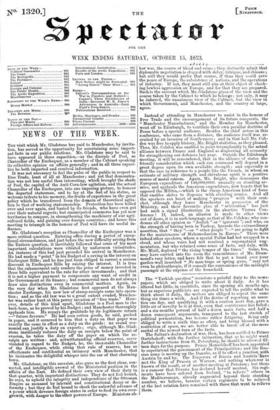NEWS OF THE WEEK.
Tnm 'visit which Mr. Gladstone has paid to Manchester, by invita- tion, has served as the opportunity for ascertaining some import- ant facts in our public relations. Mr. Gladstone may be said to have appeared in three capacities,—as the disciple of Peel, as Chancellor of the Exchequer, as a member of the Cabinet speaking its collective opinion on affairs generally; and in all three capaci- ties he both imparted and received information. It was not necessary to feel the pulse of the public in respect to Free Trade, least of all at Manchester; and yet that demonstra- tion was not less useful than interesting, which brought the shade of Peel, the capital of the Anti-Corn-law agitation, and the actual Chancellor of the Exchequer, into one imposing picture, to honour the departed statesman, and to lay at the feet of his statue, as welcome tribute to his memory, the fruits of experience in the great policy which he transferred from the domain of theoretical agita- tion to that of working statesmanship. Protection has been killed over and over again, and buried by its friends, who have even got over their natural regrets; but emancipated commerce has yet new territories to conquer, in strengthening the machinery of our agri. cultural fields, and gaining over foreign countries ; and hence this meeting to triumph in the honour of Peel will have its useful in- fluence. Mr. Gladstone's reception as Chancellor of the Exchequer was a more critical question. Entering office during a period of excep- Uonal circumstances, and just before the new difficulty arising from i the Eastern question, it inevitably followed that some of his most important calculations were vitiated by unforeseen vicissitudes. Au instance of this had just preceded his arrival in Manchester. He had made a "point " in his Budget of a saving in the interest on Exchequer Bills; and he has just been obliged to correct a serious discount in Exchequer Bills by raising the interest. It is true that the enhancement only renders the price of money invested in those bilis equivalent to the rate for other investments; and that it is not a higher payment to compensate any want of credit in the Government or its finance ; but commercial men do not always draw nice distinctions even in commercial matters. Again, on the very day when Mr. Gladstone first appeared at the Man- chester Exchange, his new law of stamp-receipts came into opera- tion ; and as the old law was to a great extent evaded, Manches- ter was rather hurt at this penny invasion of "free trade." How- ever, details of this kind apart, Gladstone is a Peel man to the back-bone, as he proved by his Budget ; and Manchester thoroughly applauds him. He repays the gratitude by its legitimate return —" future favours." He had seen cotton goods, he said, packed in paper, and it occurred to him that a duty on that paper was exactly the same in effect as a duty on the goods : no sound eco- nomist can justify a duty on exports; ergo, although Mr. Glad- stone insidiously reduces the duty on receipts below the point of evasion, he takes the duty off the paper on which the re- ceipts are written : and, notwithstanding official reserves, never violated in regard to the Budget, he, the inexorable Chancellor of the Exchequer, while citing that rule of reserve, has so affectionate and confidential an intimacy with Manchester, that he insinuates the delightful whisper into the ear of that charming town. Mr. Gladstone, on this occasion, also gave us the first clear, con- nected, and intelligible avowal of the Ministerial position in the affairs_ of the East. He defined their own view of their duty in that quarter, with important distinctions. They do not feel bound, he says, to uphold the integrity. and independence of the Ottoman Empire as menaced by internal and constitutional decay or de- formity ; but they do feel bound to check the unlawful advance of a power vihich devours foreign states in order to feed its own over- growth, with danger to the other powers of Europe. Ministers ab- hor war, the source of blood and crime ; they distinctly admit that diplomatic negotiation is clogged with delay, intrigue, and chicane ; but still they would prefer that course, if thus they could save the peace of Europe, the subsistence of nations, and the operations industry. ndustry. If not, they must still aim at their object of check- ing lawless aggression on Europe, and for that they are prepared. Such is the account which Mr. Gladstone gives of the view and the course taken by the Cabinet to which he belongs ; not only, it may be inferred, the unanimous view of the Cabinet, but the view in which Government, and Manchester, and the country at large, agree.


























